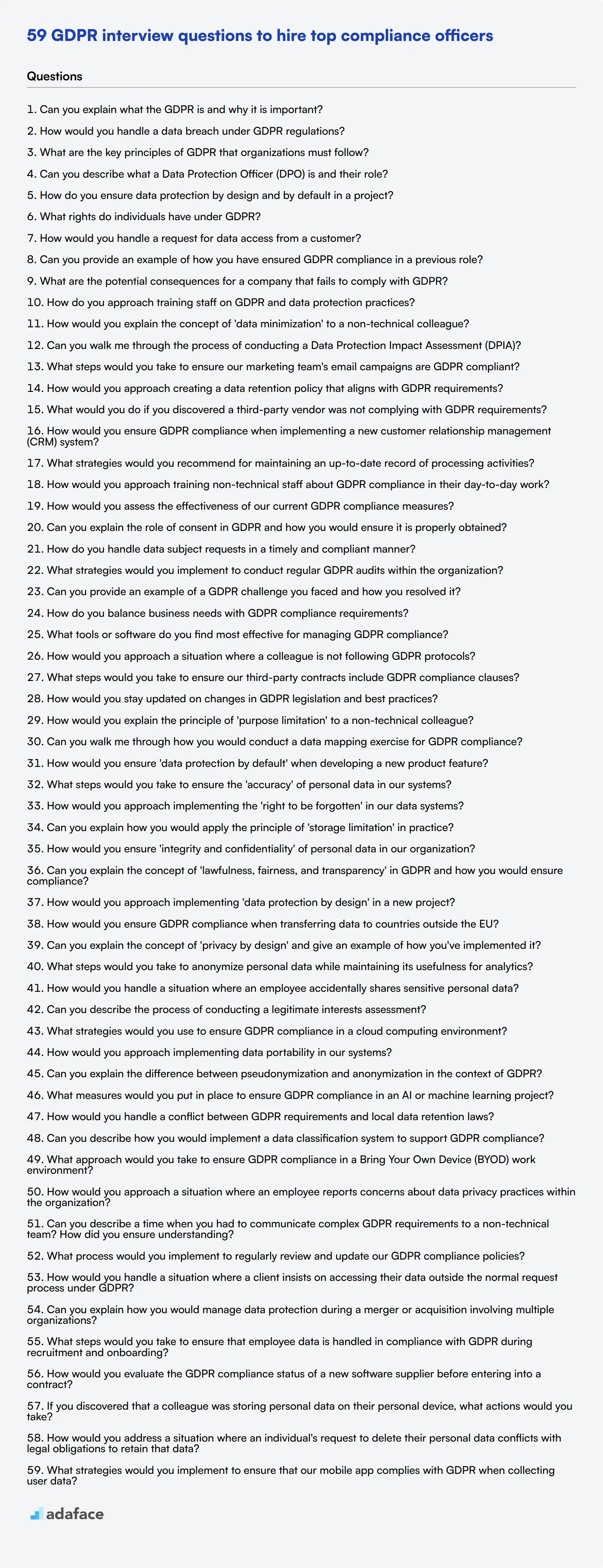In today's data-driven world, ensuring compliance with GDPR regulations is paramount for businesses handling personal information. Hiring the right compliance officers and data protection experts is crucial to safeguarding sensitive data and avoiding hefty fines.
This blog post provides a comprehensive list of GDPR interview questions tailored for different experience levels and roles. From common queries to situational scenarios, we cover a wide range of topics to help you assess candidates' knowledge and problem-solving abilities in data protection.
By using these questions, you can effectively evaluate applicants' understanding of GDPR principles and their practical application. Consider combining these interview questions with a pre-screening GDPR assessment to streamline your hiring process and identify top talent efficiently.
Table of contents
10 common GDPR interview questions to ask your candidates
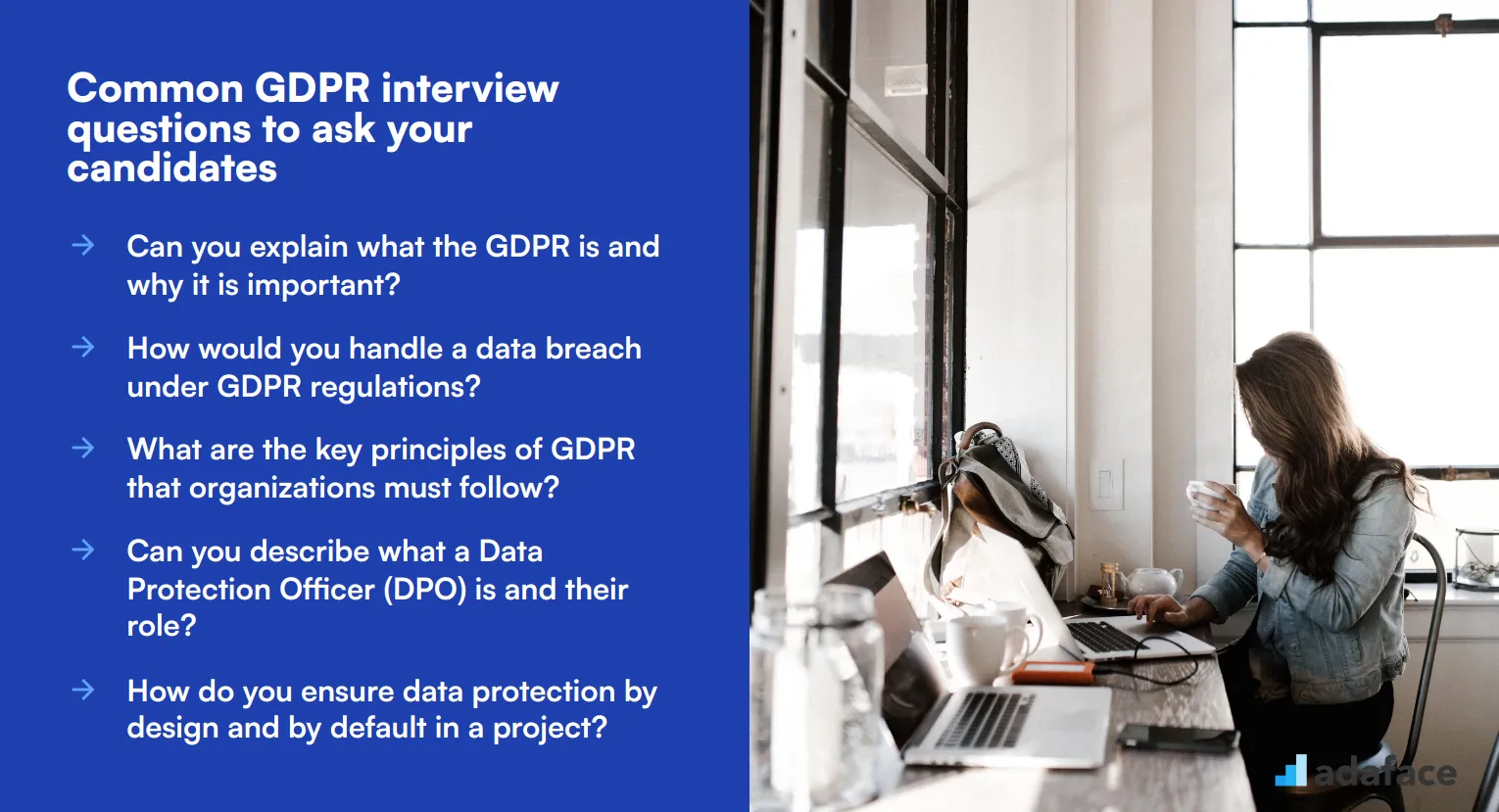
To determine whether your candidates have a solid understanding of GDPR, you can use this list of common interview questions. These questions are designed to help you assess their knowledge and readiness to handle GDPR-related responsibilities within your organization. For more details on job roles related to security, you can check out this chief information security officer job description.
- Can you explain what the GDPR is and why it is important?
- How would you handle a data breach under GDPR regulations?
- What are the key principles of GDPR that organizations must follow?
- Can you describe what a Data Protection Officer (DPO) is and their role?
- How do you ensure data protection by design and by default in a project?
- What rights do individuals have under GDPR?
- How would you handle a request for data access from a customer?
- Can you provide an example of how you have ensured GDPR compliance in a previous role?
- What are the potential consequences for a company that fails to comply with GDPR?
- How do you approach training staff on GDPR and data protection practices?
8 GDPR interview questions and answers to evaluate junior compliance officers
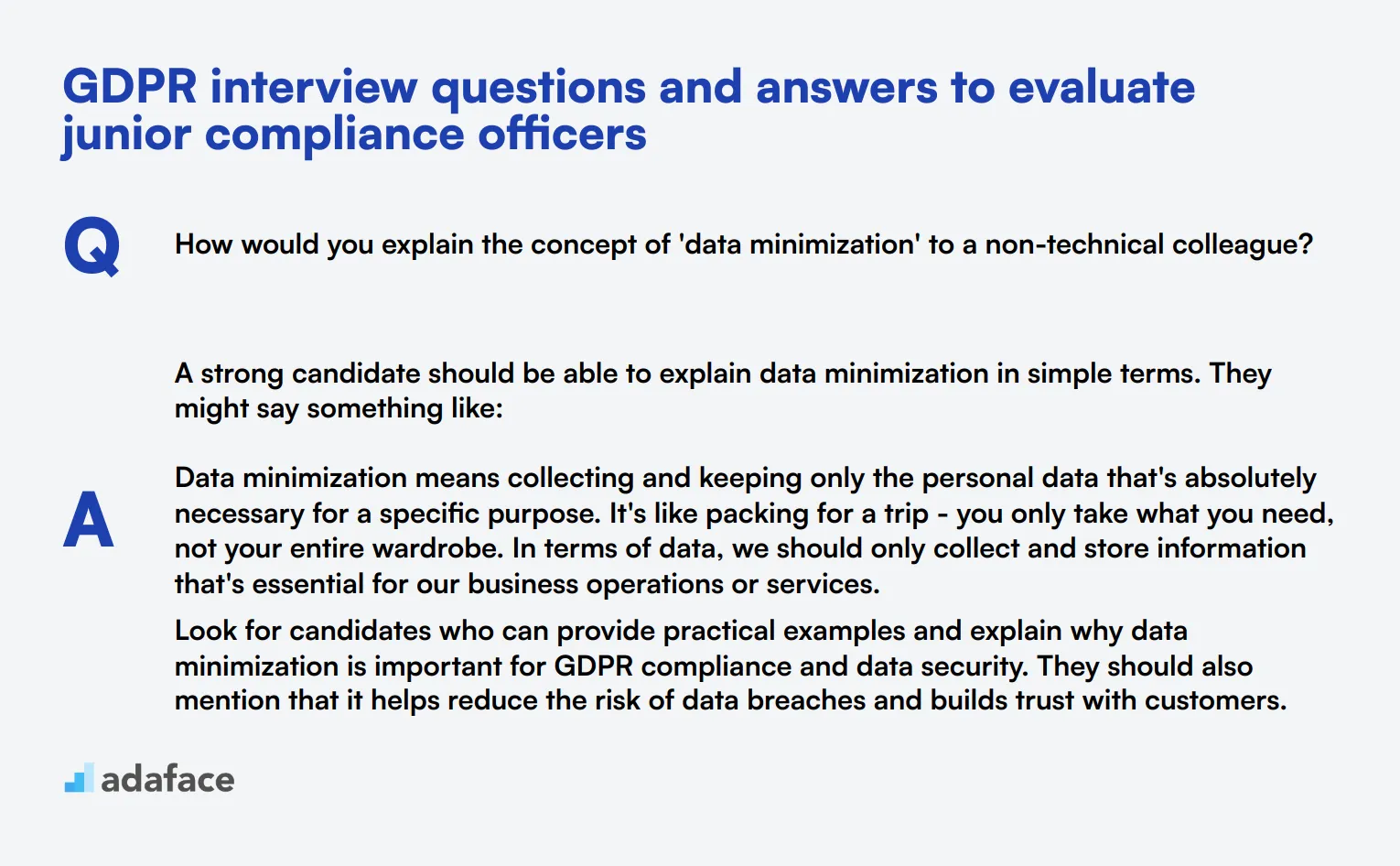
Ready to put your junior compliance officers to the test? These 8 GDPR interview questions will help you assess their knowledge and problem-solving skills. Use them to evaluate candidates' understanding of data protection principles and their ability to apply GDPR regulations in real-world scenarios. Remember, the goal is to find someone who can help your organization stay compliant and secure.
1. How would you explain the concept of 'data minimization' to a non-technical colleague?
A strong candidate should be able to explain data minimization in simple terms. They might say something like:
Data minimization means collecting and keeping only the personal data that's absolutely necessary for a specific purpose. It's like packing for a trip - you only take what you need, not your entire wardrobe. In terms of data, we should only collect and store information that's essential for our business operations or services.
Look for candidates who can provide practical examples and explain why data minimization is important for GDPR compliance and data security. They should also mention that it helps reduce the risk of data breaches and builds trust with customers.
2. Can you walk me through the process of conducting a Data Protection Impact Assessment (DPIA)?
A competent junior compliance officer should be able to outline the key steps in conducting a DPIA:
- Identify the need for a DPIA: Determine if the processing is likely to result in high risk to individuals' rights and freedoms.
- Describe the information flow: Detail how personal data will be collected, used, stored, and deleted.
- Identify privacy and related risks: Assess potential impacts on individuals and the organization.
- Identify and evaluate privacy solutions: Propose measures to reduce or eliminate the risks.
- Sign off and record outcomes: Get approval from the DPO or relevant authority.
- Integrate outcomes into the project plan: Implement the agreed-upon solutions.
- Consult with the supervisory authority if high risks remain.
Look for candidates who emphasize the importance of documentation throughout the process and mention that DPIAs should be ongoing, not just a one-time activity.
3. What steps would you take to ensure our marketing team's email campaigns are GDPR compliant?
A good answer should cover the following key points:
- Obtain explicit consent: Ensure subscribers have opted-in to receive marketing emails.
- Provide clear opt-out options: Every email should have an easy unsubscribe mechanism.
- Keep records of consent: Maintain documentation of when and how consent was obtained.
- Segment email lists: Only send relevant content to interested subscribers.
- Regularly clean email lists: Remove inactive subscribers and honor unsubscribe requests promptly.
- Use privacy-friendly forms: Collect only necessary information for marketing purposes.
- Be transparent: Clearly communicate how subscriber data will be used.
Look for candidates who also mention the importance of regular data protection training for the marketing team and staying updated on GDPR guidelines for electronic communications.
4. How would you approach creating a data retention policy that aligns with GDPR requirements?
A strong candidate should outline a structured approach to creating a GDPR-compliant data retention policy:
- Inventory all data: Identify what personal data is collected and where it's stored.
- Determine purpose: Establish why each type of data is collected and processed.
- Set retention periods: Define how long each type of data needs to be kept based on legal requirements and business needs.
- Establish deletion procedures: Create processes for securely deleting or anonymizing data when retention periods end.
- Document justifications: Clearly explain the reasons for chosen retention periods.
- Create exceptions handling: Define procedures for extending retention in special cases (e.g., ongoing investigations).
- Implement technical measures: Ensure systems can enforce the retention policy automatically where possible.
- Train staff: Educate employees on the policy and their responsibilities.
- Regular review: Schedule periodic reviews to keep the policy up-to-date with changing laws and business needs.
Look for candidates who emphasize the importance of balancing legal compliance with business needs, and who mention the need for flexibility to accommodate different types of data and processing activities.
5. What would you do if you discovered a third-party vendor was not complying with GDPR requirements?
A competent junior compliance officer should outline a systematic approach to addressing vendor non-compliance:
- Document the issue: Record all details of the discovered non-compliance.
- Assess the risk: Evaluate the potential impact on data subjects and the organization.
- Notify relevant parties: Inform the DPO and legal team about the situation.
- Contact the vendor: Communicate the concerns and request immediate corrective action.
- Review the contract: Check the agreement for GDPR compliance clauses and potential breach of contract.
- Set a deadline: Give the vendor a reasonable timeframe to address the issues.
- Monitor progress: Follow up regularly to ensure the vendor is taking necessary steps.
- Consider alternatives: If the vendor fails to comply, explore options to terminate the relationship and find a compliant alternative.
- Report if necessary: If the non-compliance poses a significant risk, consider reporting to the supervisory authority.
Look for candidates who emphasize the importance of maintaining detailed records of all actions taken and who mention the need to review and potentially strengthen vendor management processes to prevent future incidents.
6. How would you ensure GDPR compliance when implementing a new customer relationship management (CRM) system?
A strong answer should cover the following key points:
- Conduct a DPIA: Assess the risks associated with processing personal data in the new CRM system.
- Data mapping: Identify what personal data will be collected, processed, and stored in the CRM.
- Privacy by design: Ensure the CRM has built-in features for data protection (e.g., encryption, access controls).
- Data minimization: Configure the system to collect only necessary data for specific purposes.
- Consent management: Implement mechanisms to record and manage user consent.
- Access controls: Set up role-based access to limit data visibility to authorized personnel only.
- Data retention: Configure automated data deletion or anonymization based on retention policies.
- Subject rights: Ensure the CRM can facilitate data subject rights (e.g., access, rectification, erasure).
- Vendor assessment: If using a cloud-based CRM, verify the provider's GDPR compliance.
- Staff training: Educate users on GDPR-compliant practices within the new CRM system.
Look for candidates who also mention the importance of documenting all decisions and configurations related to GDPR compliance, and who suggest ongoing monitoring and auditing of the CRM system's use.
7. What strategies would you recommend for maintaining an up-to-date record of processing activities?
A competent junior compliance officer should suggest a comprehensive approach to maintaining records of processing activities:
- Create a template: Develop a standardized format for recording processing activities.
- Assign responsibility: Designate specific individuals or teams to maintain and update the records.
- Regular reviews: Schedule periodic (e.g., quarterly) reviews of all processing activities.
- Change management process: Implement a system to capture any new processing activities or changes to existing ones.
- Integration with other processes: Link the record-keeping to other compliance activities like DPIAs and privacy impact assessments.
- Use technology: Implement data discovery and mapping tools to automate parts of the process.
- Cross-departmental collaboration: Establish channels for different departments to report changes in their data processing activities.
- Audit trail: Maintain a log of all updates made to the records, including who made them and when.
- Accessibility: Ensure the records are easily accessible to authorized personnel and the supervisory authority if required.
Look for candidates who emphasize the importance of making this an ongoing, dynamic process rather than a one-time exercise. They should also mention the need for the records to be both comprehensive and easily understandable.
8. How would you approach training non-technical staff about GDPR compliance in their day-to-day work?
A strong answer should outline a multi-faceted approach to GDPR training for non-technical staff:
- Tailor content: Create role-specific training materials that relate GDPR concepts to everyday tasks.
- Use real-world scenarios: Provide practical examples and case studies relevant to different departments.
- Interactive sessions: Conduct workshops with Q&A sessions and group discussions.
- Regular refreshers: Schedule periodic short training sessions to reinforce key concepts.
- E-learning modules: Develop online courses that staff can complete at their own pace.
- Visual aids: Use infographics, posters, and quick reference guides for key GDPR principles.
- Gamification: Implement quizzes or simulations to make learning more engaging.
- Mentorship program: Pair GDPR-savvy employees with those who need more support.
- Feedback mechanism: Encourage staff to ask questions and report potential issues.
- Measure understanding: Conduct assessments to gauge the effectiveness of the training.
Look for candidates who emphasize the importance of creating a privacy-aware culture and making GDPR compliance a part of everyday operations. They should also mention the need for continuous improvement of the training program based on feedback and evolving GDPR interpretations.
10 intermediate GDPR interview questions and answers to ask mid-tier compliance officers.
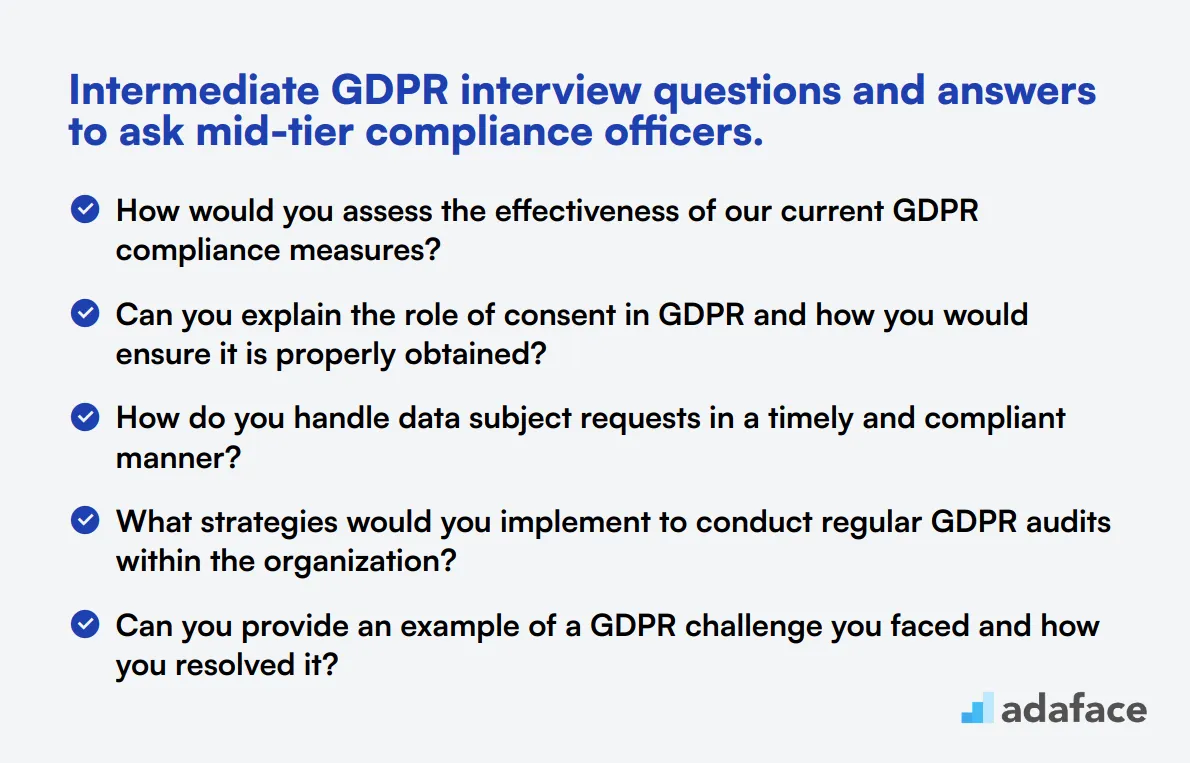
To evaluate the expertise of mid-tier compliance officers, utilize this list of intermediate GDPR interview questions. These questions are designed to assess candidates' understanding of practical GDPR applications and their ability to ensure compliance within an organization. For a comprehensive view of roles related to data protection, check out our job descriptions.
- How would you assess the effectiveness of our current GDPR compliance measures?
- Can you explain the role of consent in GDPR and how you would ensure it is properly obtained?
- How do you handle data subject requests in a timely and compliant manner?
- What strategies would you implement to conduct regular GDPR audits within the organization?
- Can you provide an example of a GDPR challenge you faced and how you resolved it?
- How do you balance business needs with GDPR compliance requirements?
- What tools or software do you find most effective for managing GDPR compliance?
- How would you approach a situation where a colleague is not following GDPR protocols?
- What steps would you take to ensure our third-party contracts include GDPR compliance clauses?
- How would you stay updated on changes in GDPR legislation and best practices?
9 GDPR interview questions and answers related to data protection principles
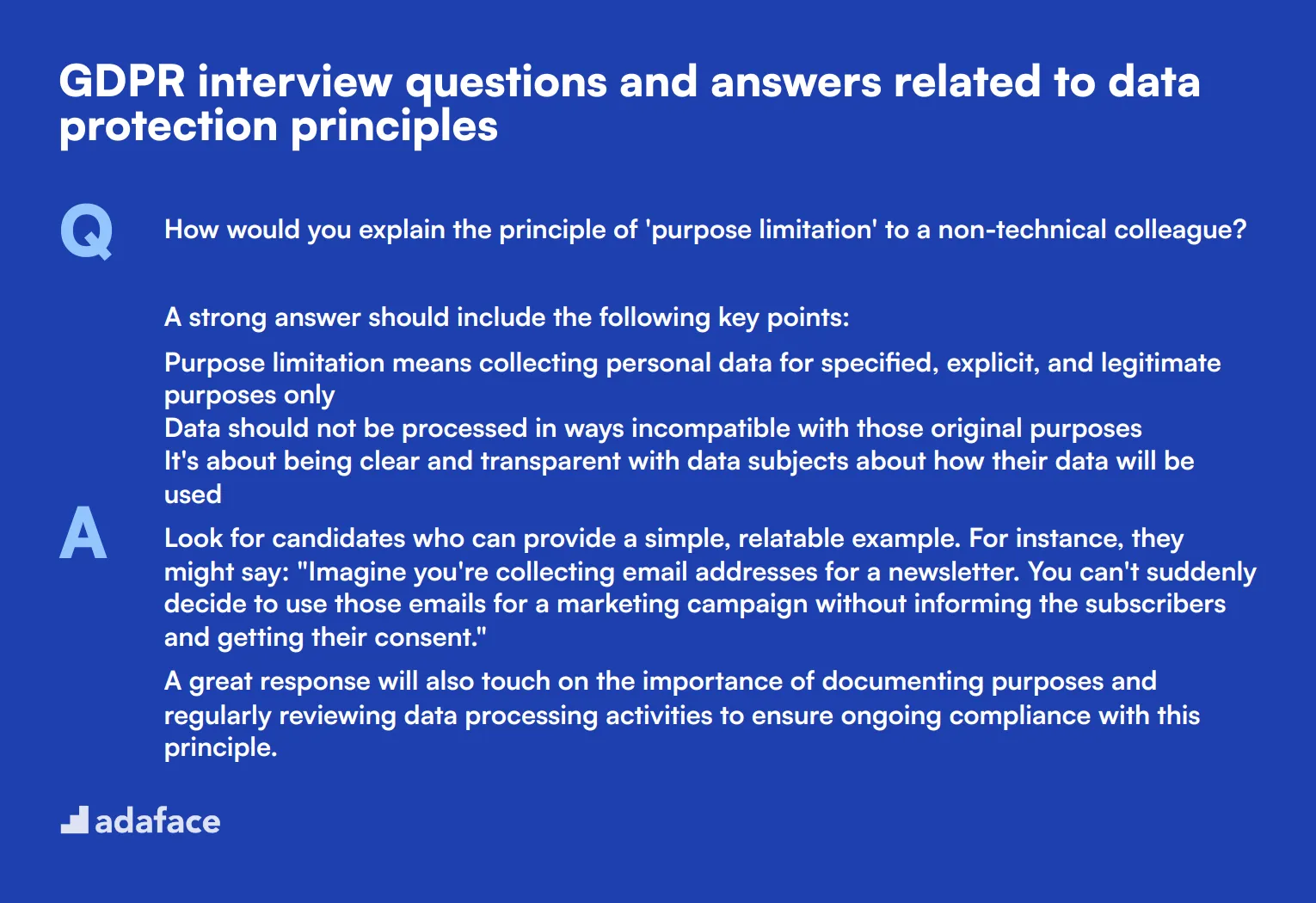
Ready to dive into the nitty-gritty of GDPR? These nine questions will help you assess a candidate's understanding of data protection principles. Use them to gauge how well applicants can apply GDPR concepts in real-world scenarios. Remember, the goal isn't just to test knowledge, but to evaluate skills that ensure robust data protection practices.
1. How would you explain the principle of 'purpose limitation' to a non-technical colleague?
A strong answer should include the following key points:
- Purpose limitation means collecting personal data for specified, explicit, and legitimate purposes only
- Data should not be processed in ways incompatible with those original purposes
- It's about being clear and transparent with data subjects about how their data will be used
Look for candidates who can provide a simple, relatable example. For instance, they might say: "Imagine you're collecting email addresses for a newsletter. You can't suddenly decide to use those emails for a marketing campaign without informing the subscribers and getting their consent."
A great response will also touch on the importance of documenting purposes and regularly reviewing data processing activities to ensure ongoing compliance with this principle.
2. Can you walk me through how you would conduct a data mapping exercise for GDPR compliance?
A comprehensive answer should outline a step-by-step process:
- Identify all personal data processing activities
- Document data types, sources, and storage locations
- Track data flows within the organization and to third parties
- Assess the legal basis for processing each data type
- Evaluate data retention periods and deletion processes
- Identify potential risks and implement necessary safeguards
Look for candidates who emphasize the importance of collaboration across departments. They should mention involving IT, legal, and key business units to ensure a thorough mapping process.
An ideal response will also highlight the need for regular updates to the data map, as data processing activities can change over time. The candidate might suggest using specialized data mapping tools or software to streamline the process and maintain accuracy.
3. How would you ensure 'data protection by default' when developing a new product feature?
A strong answer should cover the following points:
- Implement privacy settings at the highest level by default
- Collect only the minimum amount of personal data necessary for the feature
- Ensure data is automatically deleted or anonymized when no longer needed
- Use encryption and access controls to protect data from unauthorized access
- Conduct a Data Protection Impact Assessment (DPIA) before launching the feature
Look for candidates who emphasize the importance of involving privacy experts or Data Protection Officers early in the development process. They should also mention the need for clear documentation of privacy-related decisions and implementations.
An excellent response might include examples of specific technical measures, such as data minimization techniques, pseudonymization, or privacy-enhancing technologies. The candidate should also stress the importance of user-friendly privacy controls and transparent communication about data processing practices to end-users.
4. What steps would you take to ensure the 'accuracy' of personal data in our systems?
A comprehensive answer should include the following steps:
- Implement data validation checks at the point of collection
- Regularly audit and clean databases to identify and correct inaccuracies
- Provide easy ways for data subjects to update their information
- Cross-check data against authoritative sources when possible
- Implement processes to promptly correct or delete inaccurate data
- Train staff on the importance of data accuracy and proper data entry procedures
Look for candidates who emphasize the ongoing nature of maintaining data accuracy. They should mention the need for automated processes where possible, but also recognize the importance of human oversight.
A strong response might also touch on the challenges of maintaining accuracy in large datasets and suggest strategies like data quality metrics, regular data health checks, or the use of data quality management tools. The candidate should also highlight the importance of documenting all efforts to maintain accuracy for compliance purposes.
5. How would you approach implementing the 'right to be forgotten' in our data systems?
A well-thought-out answer should cover these key points:
- Establish a clear process for receiving and verifying erasure requests
- Create a comprehensive data inventory to locate all instances of the individual's data
- Develop procedures for deleting or anonymizing data across all systems and backups
- Implement technical solutions to automate the erasure process where possible
- Ensure third-party processors are notified and comply with the erasure request
- Maintain logs of erasure requests and actions taken for accountability
Look for candidates who recognize the complexities involved, such as balancing the right to be forgotten with other legal obligations or legitimate interests that may require data retention. They should also mention the importance of having a clear policy on when erasure requests can be refused.
An excellent response might include considerations for edge cases, such as handling partial erasure requests or dealing with derived data. The candidate should also emphasize the need for staff training on handling these requests and the importance of timely responses to comply with GDPR's one-month deadline.
6. Can you explain how you would apply the principle of 'storage limitation' in practice?
A strong answer should include the following key points:
- Establish clear retention periods for different types of personal data
- Regularly review and update retention schedules
- Implement automated deletion or anonymization processes for data that has exceeded its retention period
- Ensure backup and archive systems also comply with retention policies
- Document justifications for any extended retention periods
Look for candidates who emphasize the importance of balancing business needs with data protection requirements. They should mention the need for a cross-departmental approach, involving legal, IT, and business units in determining appropriate retention periods.
An ideal response might also touch on the challenges of implementing storage limitation in legacy systems or with unstructured data. The candidate should suggest strategies like data classification, regular data audits, and the use of data lifecycle management tools to ensure ongoing compliance with this principle.
7. How would you ensure 'integrity and confidentiality' of personal data in our organization?
A comprehensive answer should cover both technical and organizational measures:
- Implement strong encryption for data at rest and in transit
- Use access controls and least privilege principles
- Regularly update and patch systems to address security vulnerabilities
- Conduct regular security audits and penetration testing
- Implement multi-factor authentication for sensitive systems
- Provide ongoing security awareness training for all staff
Look for candidates who recognize that integrity and confidentiality are ongoing processes, not one-time implementations. They should emphasize the need for a comprehensive information security management system (ISMS) and mention the value of certifications like ISO 27001.
A strong response might also include discussion of incident response plans, data breach notification procedures, and the importance of fostering a culture of security within the organization. The candidate should highlight the need for regular risk assessments and adapting security measures to evolving threats.
8. Can you explain the concept of 'lawfulness, fairness, and transparency' in GDPR and how you would ensure compliance?
A well-rounded answer should cover these key aspects:
- Lawfulness: Ensuring a valid legal basis for all data processing activities
- Fairness: Processing data in ways that data subjects would reasonably expect
- Transparency: Providing clear, accessible information about data processing practices
To ensure compliance, the candidate should mention:
- Conducting regular audits of data processing activities
- Maintaining up-to-date privacy notices and policies
- Implementing user-friendly consent mechanisms where necessary
- Providing easy access for data subjects to exercise their rights
- Ensuring staff are trained on these principles and their practical application
Look for candidates who can provide specific examples of how these principles might be applied in real-world scenarios. They should also emphasize the importance of documenting decisions and processes to demonstrate compliance. An excellent response might touch on the challenges of balancing these principles in complex data processing situations and suggest strategies for addressing potential conflicts.
9. How would you approach implementing 'data protection by design' in a new project?
A strong answer should outline a systematic approach:
- Conduct a Data Protection Impact Assessment (DPIA) at the project's outset
- Incorporate privacy considerations into the project's requirements and design specifications
- Use techniques like data minimization, pseudonymization, and encryption from the start
- Implement privacy-enhancing technologies where appropriate
- Design user interfaces that make privacy options clear and accessible
- Build in features that facilitate data subject rights (e.g., easy data export or deletion)
Look for candidates who emphasize the importance of involving privacy experts or Data Protection Officers throughout the project lifecycle. They should also mention the need for ongoing privacy reviews as the project evolves.
An excellent response might include discussion of privacy design patterns or frameworks, such as Privacy by Design (PbD) principles. The candidate should also highlight the importance of documenting privacy-related decisions and implementations to demonstrate compliance. They might mention the potential use of privacy-focused development methodologies or tools to support this approach.
12 GDPR interview questions about data privacy regulations
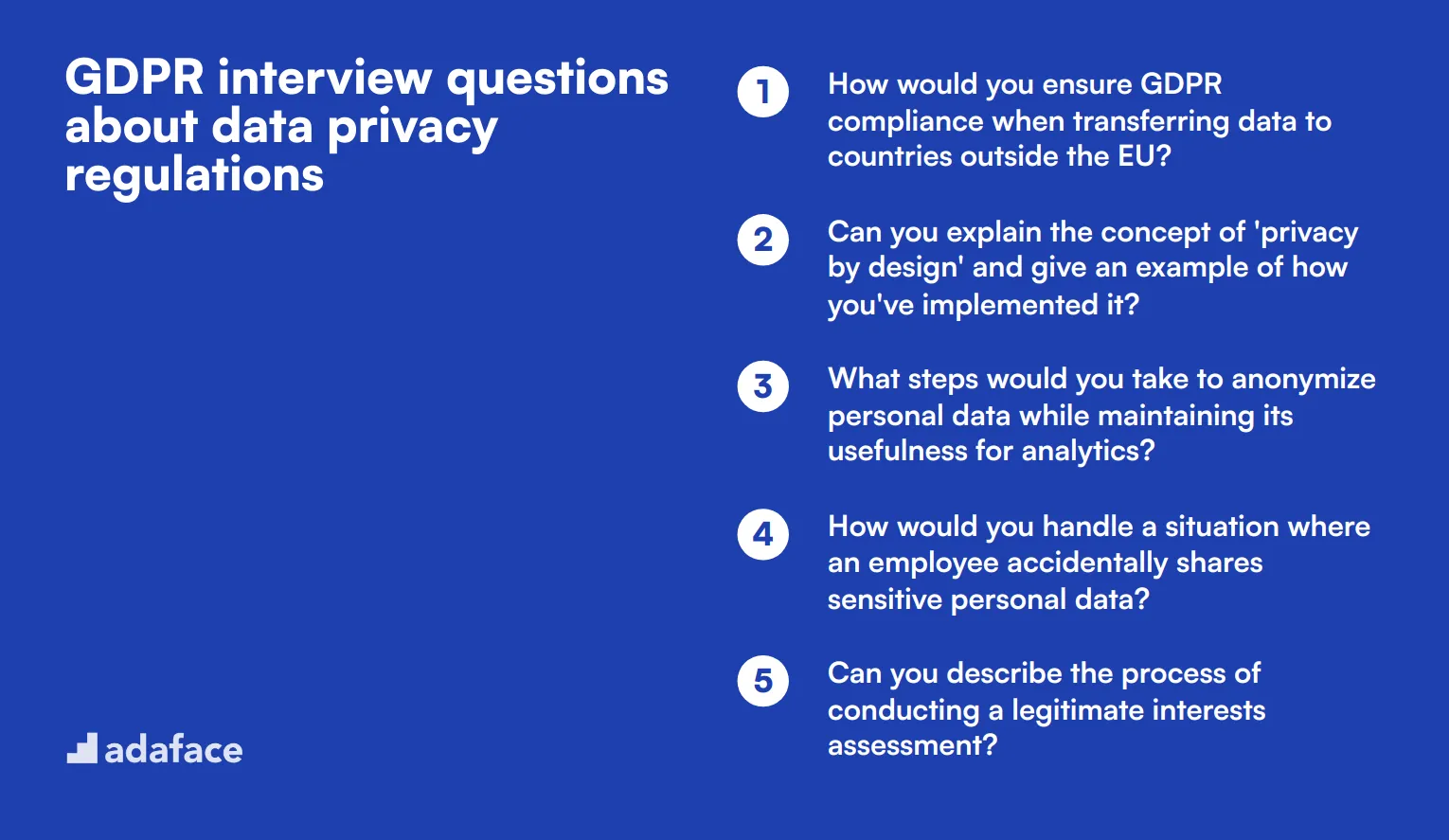
To assess candidates' understanding of GDPR and its practical applications, consider using these 12 interview questions. They are designed to help hiring managers evaluate a candidate's knowledge of data privacy regulations and their ability to implement GDPR compliance measures effectively.
- How would you ensure GDPR compliance when transferring data to countries outside the EU?
- Can you explain the concept of 'privacy by design' and give an example of how you've implemented it?
- What steps would you take to anonymize personal data while maintaining its usefulness for analytics?
- How would you handle a situation where an employee accidentally shares sensitive personal data?
- Can you describe the process of conducting a legitimate interests assessment?
- What strategies would you use to ensure GDPR compliance in a cloud computing environment?
- How would you approach implementing data portability in our systems?
- Can you explain the difference between pseudonymization and anonymization in the context of GDPR?
- What measures would you put in place to ensure GDPR compliance in an AI or machine learning project?
- How would you handle a conflict between GDPR requirements and local data retention laws?
- Can you describe how you would implement a data classification system to support GDPR compliance?
- What approach would you take to ensure GDPR compliance in a Bring Your Own Device (BYOD) work environment?
10 situational GDPR interview questions for hiring top compliance officers
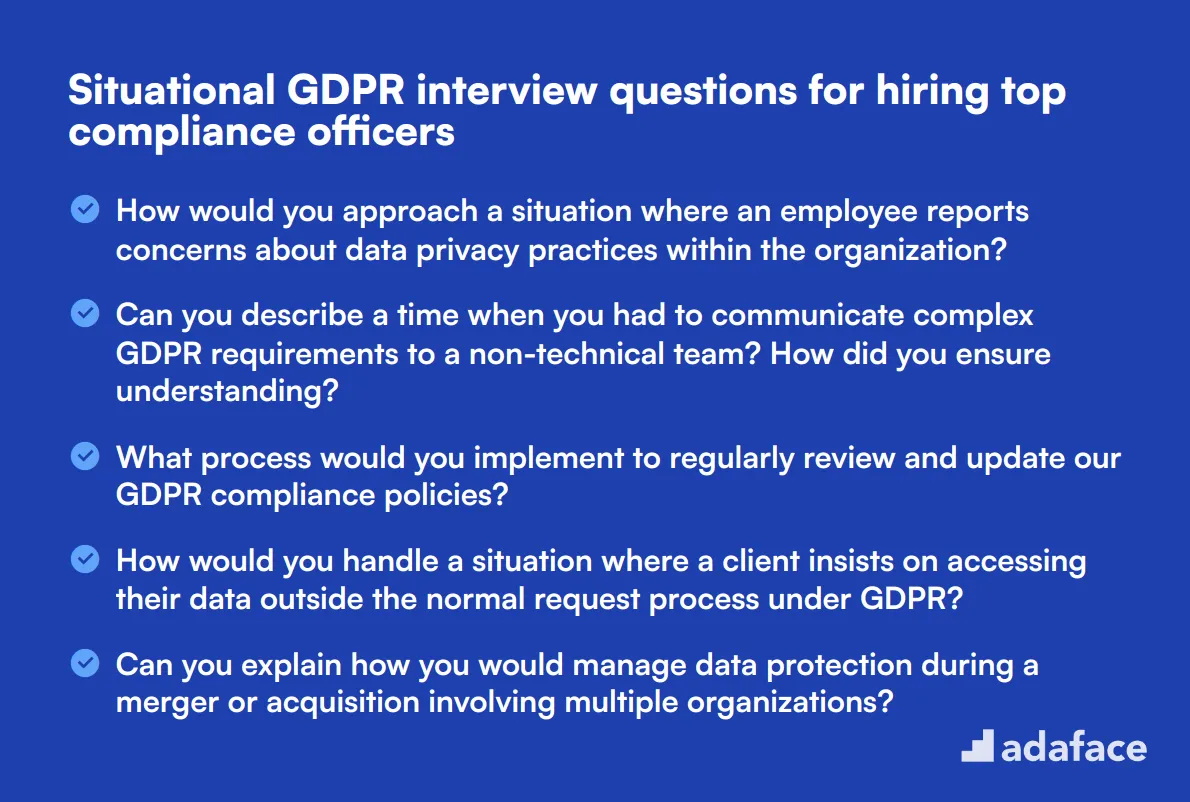
To assess whether candidates possess the necessary skills for GDPR compliance, these situational interview questions are designed to reveal their practical understanding of the regulations. Use this list to evaluate how applicants would handle real-world scenarios and ensure effective data protection in your organization, especially when filling critical roles like a compliance officer.
- How would you approach a situation where an employee reports concerns about data privacy practices within the organization?
- Can you describe a time when you had to communicate complex GDPR requirements to a non-technical team? How did you ensure understanding?
- What process would you implement to regularly review and update our GDPR compliance policies?
- How would you handle a situation where a client insists on accessing their data outside the normal request process under GDPR?
- Can you explain how you would manage data protection during a merger or acquisition involving multiple organizations?
- What steps would you take to ensure that employee data is handled in compliance with GDPR during recruitment and onboarding?
- How would you evaluate the GDPR compliance status of a new software supplier before entering into a contract?
- If you discovered that a colleague was storing personal data on their personal device, what actions would you take?
- How would you address a situation where an individual's request to delete their personal data conflicts with legal obligations to retain that data?
- What strategies would you implement to ensure that our mobile app complies with GDPR when collecting user data?
Which GDPR skills should you evaluate during the interview phase?
While a single interview may not reveal every aspect of a candidate's capabilities, focusing on core GDPR skills can provide a clear understanding of their qualifications and potential. This section outlines the key GDPR skills to evaluate, ensuring a comprehensive assessment of each candidate's readiness and expertise.
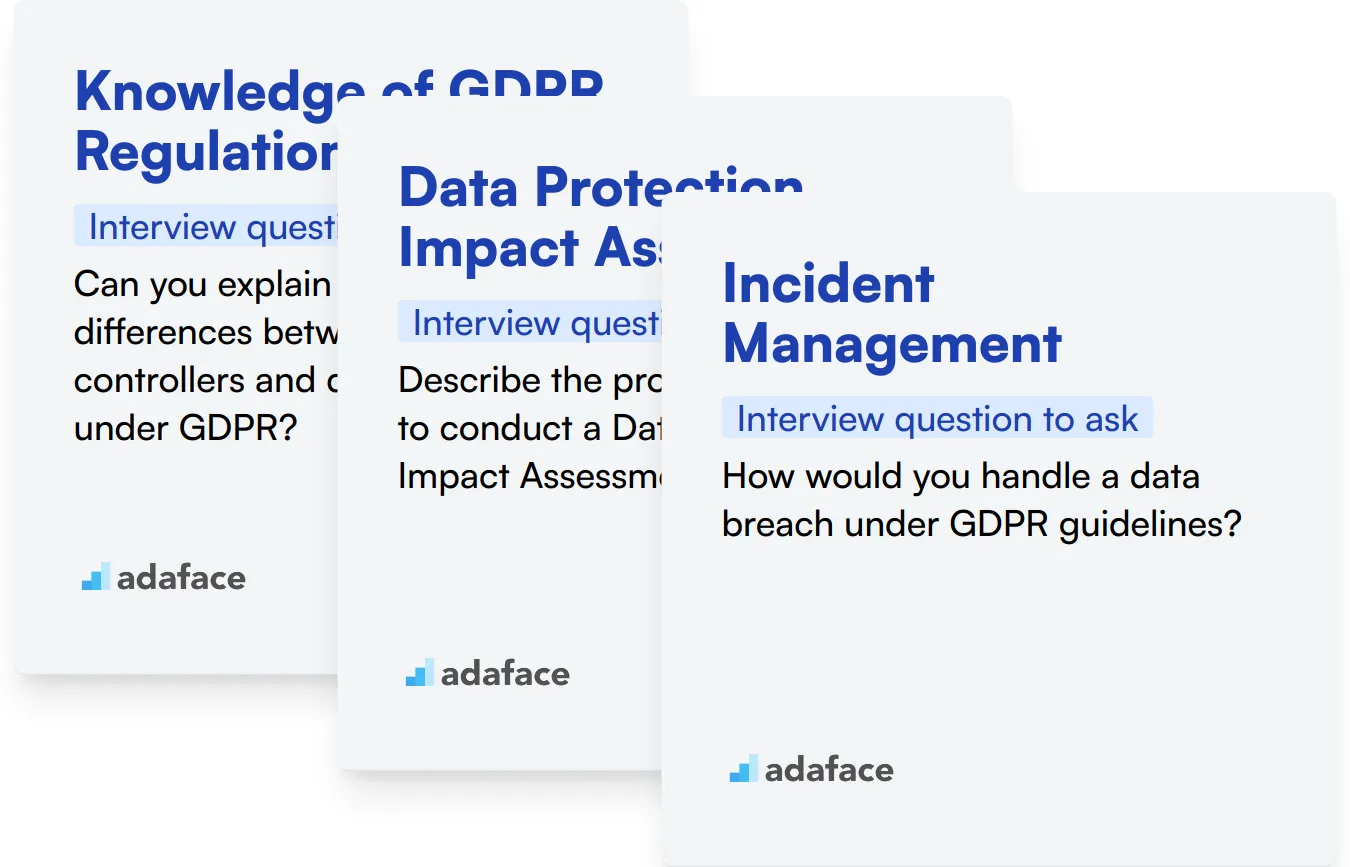
Knowledge of GDPR Regulations
Understanding the intricacies of GDPR regulations is fundamental for any compliance officer. This knowledge ensures that the organization adheres to all legal standards, thereby preventing potential fines and damages to reputation.
Consider utilizing a tailored assessment test that includes multiple-choice questions to gauge candidates' understanding of GDPR. The GDPR online test at Adaface could be an excellent resource for this purpose.
To further probe the candidate’s knowledge in a real-life context, you can ask specific interview questions about GDPR.
Can you explain the key differences between data controllers and data processors under GDPR?
Look for detailed explanations that clarify the distinct responsibilities and requirements for both roles, indicating a deep understanding of GDPR.
Data Protection Impact Assessment (DPIA)
The ability to conduct DPIA is essential as it helps identify and minimize the data protection risks of a project. This skill is crucial for ensuring that an organization's data handling practices comply with GDPR requirements.
An interview question can evaluate the practical application of their DPIA skills.
Describe the process you follow to conduct a Data Protection Impact Assessment.
Expect a structured response that outlines clear steps including identification of data processing and assessment of risk, which demonstrates both knowledge and experience in handling DPIAs.
Incident Management
Proficiency in incident management under GDPR is key, as it involves the procedures followed after a data breach, including notification to the regulatory authority and affected individuals. This skill ensures timely and compliant response to potential data breaches.
To understand their ability to manage data breaches, consider asking the following question during the interview.
How would you handle a data breach under GDPR guidelines?
A competent answer would include immediate actions, notification protocols, and mitigation strategies, reflecting an understanding of GDPR's urgency and compliance requirements.
Hire top talent with GDPR skills tests and the right interview questions
When hiring for positions that require GDPR expertise, it's important to ensure candidates possess the necessary skills. A structured approach will help you identify the right talent who can effectively handle data protection and compliance responsibilities.
One of the best ways to assess a candidate's GDPR knowledge is by utilizing skills tests. Consider using our GDPR online test to evaluate their understanding and competence in this area.
After administering the test, you can effectively shortlist the most qualified applicants for interviews. This process streamlines your recruitment and helps you focus on individuals who truly meet your requirements.
To get started, visit our test library to find the right assessments for your hiring needs. You can also sign up to explore more options tailored to your organization.
GDPR Online Test
Download GDPR interview questions template in multiple formats
GDPR Interview Questions FAQs
Ask questions about data protection principles, privacy regulations, compliance practices, and situational scenarios to assess candidates' GDPR knowledge and problem-solving skills.
Combine theoretical questions with practical scenarios to gauge both knowledge and application. Use a mix of basic, intermediate, and advanced questions based on the role.
Yes, junior roles may focus on basic principles and definitions, while senior roles should include more complex scenarios, strategic planning, and leadership aspects of GDPR compliance.
Use situational questions that present real-world GDPR scenarios. This helps evaluate how candidates would apply their knowledge in practical situations.

40 min skill tests.
No trick questions.
Accurate shortlisting.
We make it easy for you to find the best candidates in your pipeline with a 40 min skills test.
Try for freeRelated posts
Free resources




